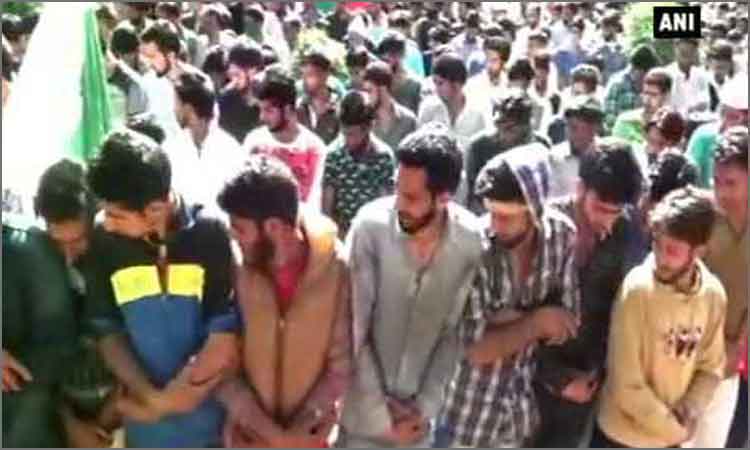Has India called out the Pakistani and Separatists’ bluff correctly on Kashmir?
- In Politics
- 09:11 PM, Jul 22, 2016
- Ajit Datta
Burhan Wani, a terrorist and a prominent face of the Pakistan-sponsored separatist movement in Kashmir, was gunned down by Indian forces last week. Unrest has ensued in the region, and the Pakistani establishment seems to be in a panic-stricken state. The Indian establishment, it appears, have finally changed course regarding its Kashmir policy.
Wani was in his twenties. Despite being heavily armed, it is believed that he was more of a keyboard warrior than anything. His lifestyle, which has come to the fore after his death, indicates that he defied almost every tenet of Islam. And yet, if the orchestrated uproar is anything to go by, he was certainly an important cog in the separatist ecosystem. There have been phases in which the Indian security forces have retaliated indiscriminately at the Pakistan border, one such phase is ongoing. But this time the enemy within our borders was taken head on. In what was a highly successful operation, a prominent separatist was eliminated.
The Pakistan-sponsored separatist ecosystem has two sorts of people. One sort is made up of the ideologues and the politicians, who formally represent the movement and attempt to propagate its ideas in the valley. The second sort is made up of terrorists, stone-pelting and flag-unfurling youth, who keep the insurgency simmering on the ground. Often the line dividing both sorts is very thin, like it was in the case of Wani. Despite the fact that every election conducted by India witnesses massive voter turnouts, the two mainstream political parties play a double-game in the valley. Traditionally, without supporting it flatly, they have given the separatist movement a long rope.
The Modi government’s policy towards Pakistan is two pronged: supposed engagement with the powerless civilian establishment and outright aggression with the military establishment, which is the real power behind the throne. India understands that to bring its conflict with Pakistan to a logical conclusion, it will have to deal with the military establishment. It is in fact the military establishment, the armed forces and their many cronies who are often referred to as non-state actors, who fund, strategize, and choreograph every move of the separatists in Kashmir. Whether the separatist movement actually benefits Pakistan in the long run or not, it is undeniable that they have created a valuable geopolitical asset to constantly impede Indian interests.
India seems to have realized that the next big step in its conflict with the Pakistani military establishment is to render this asset worthless. Consequently, the Pakistani military establishment’s leverage will be reduced, and the most significant dispute between both neighbors (that of Kashmir obviously) will be hugely skewed in India’s favor. The chief minister’s reaction after Wani’s elimination was so moderate in comparison to the usual mainstream narrative, that it appears as if the Modi government had laid the political groundwork prior to the operation.
India also seems to have realized that the misguided are a paltry sum. Despite their capability of putting on a grand show, despite mainstream political parties of the state displaying huge tolerance towards them, it is for the first time that the separatist movement’s bluff has been called. It is time to get used to the idea that there is no such thing as the ‘Kashmir issue’, that it is in fact the same old Indo-Pak conflict at play. The difference is that Pakistan employs proxies. This isn’t a genuine, widespread crisis of identity, as it is made out to be by some. It isn’t one of those causes, which throw up ten offspring each time one of its men is killed. It is with these considerations that the Indian government has decided to terminate this so-called movement.
Of course, the decision to terminate this movement was not formally announced by the government. This is what is being speculated, and India’s aggressive approach towards Pakistan’s military establishment is wherefrom this conclusion is drawn. If one observes how smoothly people like Narendra Modi and Ajit Doval function, one would think that this is just the beginning of a full-scale purge. Apart from being bold and leaving no stones unturned, both men excel at putting India’s hostile neighbor on the back-foot. Wani’s elimination might be the first of many. But what it is more than anything, is an experiment to test the waters.
The first takeaway from the experiment is that Pakistan was rattled. The country’s military establishment did not expect one of its key pawns would be blown up. Several non-state actors across the border, mostly terrorists, conducted a memorial service for the slain fellow terrorist. The Prime Minister Nawaz Sharif too condemned his death. Clearly, the Pakistanis were too discomposed to think straight during these emotional outbursts. Now it is official that they are complicit in the valley’s militancy.
The second is takeaway is that Pakistan now fears India’s new approach. After the initial gaffes, they have indulged in damage control and attempted to turn Wani’s elimination into an international issue. They have raked up the demand of a plebiscite, and have simultaneously portrayed the elimination as an abuse of human rights. Pakistan is scared, and is seeking global empathy.
The third is that Pakistan is helpless. On Indian soil, India can blow up as many terrorists as it wants. There isn’t much Pakistan can do about it. Their discomposure and their fear originate from their helplessness.
The fourth is that a lot of damage emanating from the consequent unrest can be avoided next time around. Discretion is the key. Pictures of bullet-riddled bodies do not have to make the rounds on social media. Bodies do not have to be handed to the respective families for final rights. It would be more efficient if the leaders of the separatist ecosystem were to quietly disappear one after another.
The fifth takeaway is the belief that India can now easily pull off something of this nature. Intelligence can be gathered, the political fallout can be taken care of, and the Pakistani military establishment can be steadily pushed into a corner with every operation.
Just as Pakistan has excelled at stage-management, it is imperative that India too develop a similar capacity. This aspect is all that is lacking, and is the difference between a successful and a perfect operation. The unrest in the valley or the voices of the Indian mainstream should not deter the Indian government’s agenda. Kashmiri separatism is merely a façade, and wiping it out is well within India’s reach. India should keep in mind that Pakistan’s raison d’etre is anti-Indianism, and that it should be weakened at every opportunity.







Comments